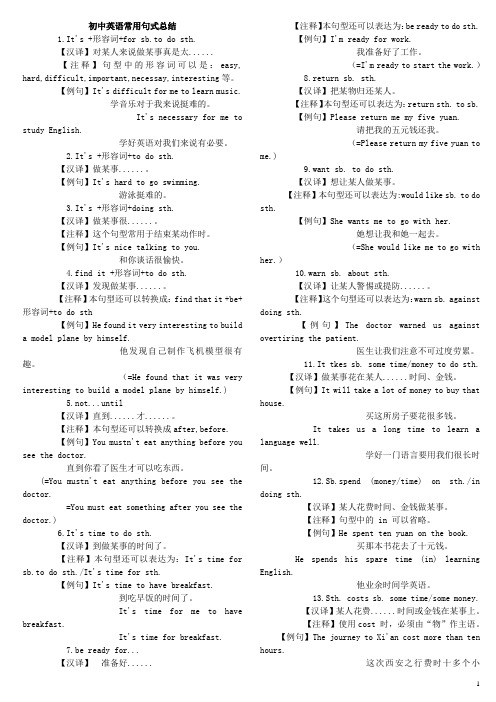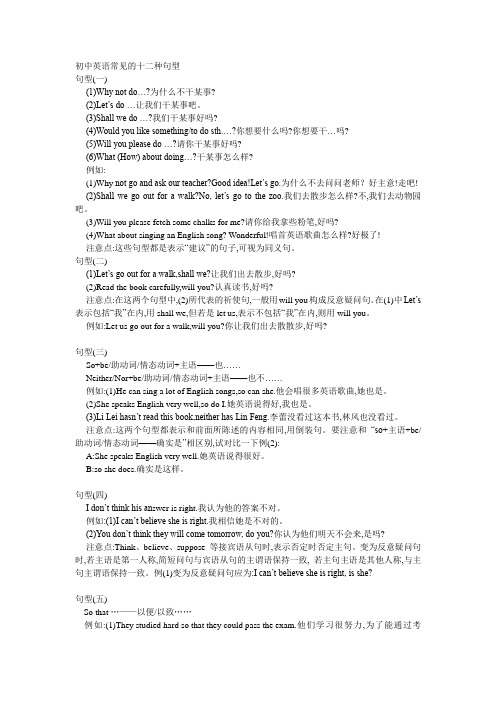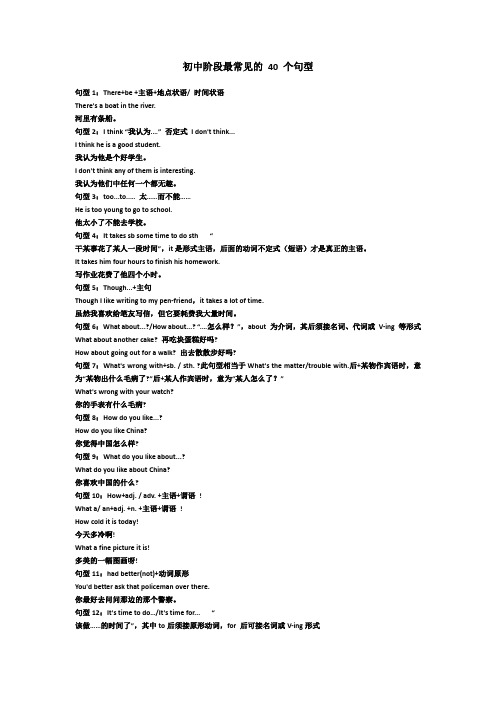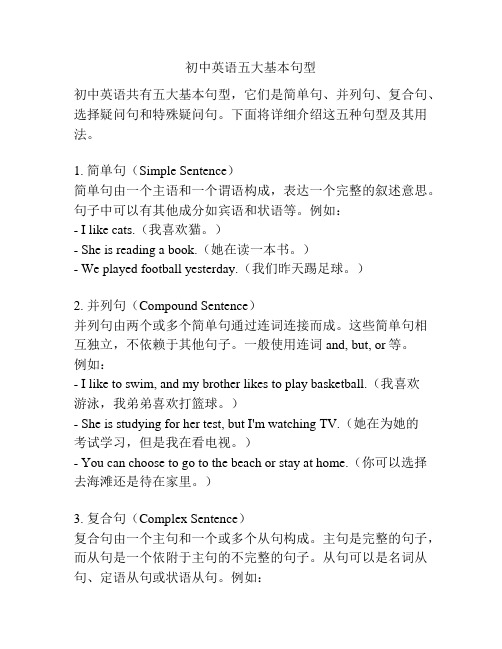初中英语常见句型(1)
初中英语简单句的基本句型

初中英语简单句的基本句型【句型一】主语+ 谓语(不及物动词) + (状语[副词、名词、介词短语等])His father cooks. 他父亲做饭。
The children are listening quietly. 孩子们在静静地听着。
He runs fast in the street. 他在街上跑得飞快。
The meeting begins at nine. 会议9点开始。
They worked day and night. 他们夜以继日地工作。
【点津】主语和不及物动词是组成本句型不可缺少的必要成分。
上述句子虽然长短不一,但都属于这一基本句型。
【句型二】主语+ 谓语(及物动词) + 宾语( + 状语)He didn’t like the film. 他不喜欢这部电影。
She often helps him. 她经常帮助他。
I have already finished reading the book. 我已经读完这本书了。
They decided to go hiking. 他们决定去徒步旅行。
He thought about the problem for a few moments. 他把这个问题思考了一会儿。
【点津】此句型中的谓语动词既可以是及物动词,也可以是短语动词,后面的宾语可以是名词、代词、动名词或动词不定式。
修饰谓语动词的状语通常放在句末,这些状语多数是副词或介词短语,也可以是名词短语、分词或不定式短语。
【句型三】主语+ 系动词+ 表语Your watch looks very nice. 你的手表看起来很漂亮。
The mooncake tastes very delicious. 这种月饼尝起来很可口。
The days get shorter and shorter. 白天变得越来越短了。
In spring, the trees turn green. 春天,树变绿了。
初中英语五种基本句型

宾语补足语的作用是:1.补充说明宾语的特点,身份等 ;2. 表示让宾语去完成的动作
充当补语的常常是:名词,形容词,副词,介词短语, 分词,动词不定式。
—We often speak English in class. —S—mo—ki—ng does harm to the health.
The rich should help the poor.
———
2. 谓语(verb):谓语可用来说明主语所做的动作 或具有的特征和状态。动词常在句中作谓语,一般 放在主语之后。分及物动词和不及物动词两种。
初中---五种基本句型
(一)五种基本句型的句子成分:
句子成分的定义:构成句子的各个部分叫做句 子成分。句子成分包括主要成分和次要成分; 主要成分有主语和谓语;次要成分有表语、宾 语、定语、状语、补足语等。
1. 主语(subject):句子所说的是“什么人 ”或“什么事物”,也就是动作的发出者, 一般由名词,代词或具有名词或代词性质 的词
→-→此句型的基本特点:谓语动词必须跟两个宾语才 能表达完整的意思,一个为直接宾语,是动作的直接承 受者,一般由表“物”的名词充当;另一个为间接宾语 ,是动作的间接承受者,一般由指“人”的名词或代词 充当。
直接宾语和间接宾语并成为双宾语。常接双宾语的动词 有:buy, pass, lend, give, tell, teach, show, bring, send等。
一、分析下列句子分别属于哪种基本句型
1. The train is coming.
初中英语常用句式总结

初中英语常用句式总结1.It's +形容词+for sb.to do sth.【汉译】对某人来说做某事真是太......【注释】句型中的形容词可以是:easy, hard,difficult,important,necessay,interesting等。
【例句】It's difficult for me to learn music.学音乐对于我来说挺难的。
It's necessary for me to study English.学好英语对我们来说有必要。
2.It's +形容词+to do sth.【汉译】做某事......。
【例句】It's hard to go swimming.游泳挺难的。
3.It's +形容词+doing sth.【汉译】做某事很......。
【注释】这个句型常用于结束某动作时。
【例句】It's nice talking to you.和你谈话很愉快。
4.find it +形容词+to do sth.【汉译】发现做某事......。
【注释】本句型还可以转换成:find that it +be+形容词+to do sth【例句】He found it very interesting to build a model plane by himself.他发现自己制作飞机模型很有趣。
(=He found that it was very interesting to build a model plane by himself.)5.not...until【汉译】直到......才......。
【注释】本句型还可以转换成after,before.【例句】You mustn't eat anything before you see the doctor.直到你看了医生才可以吃东西。
(=You mustn't eat anything before you see the doctor. =You must eat something after you see the doctor.)6.It's time to do sth.【汉译】到做某事的时间了。
中考英语-语法-简单句(一)

(梧州中考)
—______ students are there in your class?
—Fifty.
A. How many
B. How much
C. How long
D. far
解析:考查选择疑问句。how many 意为“多少”,后面修 饰可数名词复数形式;how much意为“多少”,后面修饰 不可数名词;how long意为“多长;多久”,用于询问物体 或时间的长度;how far意为“多远”,用于询问距离。 students 是可数名词复数,故选how many。 答案: A
W___h_y__are you so excited about it? 你为什么对此那么激动?
反意疑问句
反意疑问句由“陈述句+简略疑问句”两部分组成,第一部 分提出一种看法,第二部分用来质疑或表示证实。陈述部 分与疑问部分的动词时态和动词性质应保持一致,而且肯 定和否定形式彼此相反,即陈述部分为肯定式时,疑问部 分用否定式;陈述部分为否定式时,疑问部分用肯定式。
We saw e_v_e_r_y__th__in__g i_n__g__o_o_d__o__rd__e_r.我们看到所有的东西都井井有条。 宾语 介词短语作宾补
Our teacher told u__s_t_o__c_o_m___e early tomorrow.我们老师叫我们明天早来。 宾语 不定式作宾补
倒装句
N__e__v_e_r shall I do this again. 我再也不会这样做了。 3. 用于no sooner than, hardly when和not until的句型中。
N__o__t_u_n__t_il__th__e__te__a_c_h_e_r__c_a_m__e_ did he finish his homework. 直到老师来了他才完成作业。
初中英语常见的十二种句型

初中英语常见的十二种句型句型(一)(1)Why not do…?为什么不干某事?(2)Let’s do …让我们干某事吧。
(3)Shall we do …?我们干某事好吗?(4)Would you like something/to do sth.…?你想要什么吗?你想要干…吗?(5)Will you please do …?请你干某事好吗?(6)What (How) about doing…?干某事怎么样?例如:(1)Why not go and ask our teacher?Good idea!Let’s go.为什么不去问问老师?好主意!走吧!(2)Shall we go out for a walk?No, let’s go to the zoo.我们去散步怎么样?不,我们去动物园吧。
(3)Will you please fetch some chalks for me?请你给我拿些粉笔,好吗?(4)What about singing an English song? Wonderful!唱首英语歌曲怎么样?好极了!注意点:这些句型都是表示“建议”的句子,可视为同义句。
句型(二)(1)Let’s go out for a walk,shall we?让我们出去散步,好吗?(2)Read the book carefully,will you?认真读书,好吗?注意点:在这两个句型中,(2)所代表的祈使句,一般用will you构成反意疑问句。
在(1)中Let’s 表示包括“我”在内,用shall we,但若是let us,表示不包括“我”在内,则用will you。
例如:Let us go out for a walk,will you?你让我们出去散散步,好吗?句型(三)So+be/助动词/情态动词+主语——也……Neither/Nor+be/助动词/情态动词+主语——也不……例如:(1)He can sing a lot of English songs,so can she.他会唱很多英语歌曲,她也是。
初中英语常用补全对话句型和写信常用句型 (1)

初中英语常用补全对话句型1问候他人身体的句型:How are you? I am not feeling well. /I am fine.2问他人来自哪里或那个年级或居住在哪里Where are you from? I am from China.(你来自哪里?我来自中国)What grade are you from? I am from Grade Nine.(你几年级?我九年级)Where does your uncle live? He lives in Dalian.(你叔叔住哪里?他住在大连)3询问去哪里玩什么时候去坐什么车Where are you going this weekend? I am going to the new zoo this weekend.(你这周将去哪里?我将去新动物园。
)When are you going there? I am going there this Saturday morning.(你什么时候去?我这周六早上去)How will you go there? I will go there by bus./ I will take the bus.(你怎样去哪里?我坐汽车去哪里。
)4询问是否愿意和某人同行Would you like to go with me? I ’d like to. But I have to visit my uncle.(你愿意和我一起去吗?我愿意,但我要去我叔叔哪里。
)初中英语用于书信写作一、开头常用句型1 Thank you for your letter of …(谢谢你的。
来信)2 Thanks so much for your letter.(谢谢你的来信)3 I am glad to hear from you(很高兴收到你的来信)4 I would like to know some information on …(我想知道一些。
初中阶段最常见的 40 个句型

初中阶段最常见的40 个句型句型1:There+be +主语+地点状语/ 时间状语There's a boat in the river.河里有条船。
句型2:I think “我认为.…” 否定式I don't think...I think he is a good student.我认为他是个好学生。
I don't think any of them is interesting.我认为他们中任何一个都无趣。
句型3:too...to..… 太……而不能……He is too young to go to school.他太小了不能去学校。
句型4:It takes sb some time to do sth “干某事花了某人一段时间”,it是形式主语,后面的动词不定式(短语)才是真正的主语。
It takes him four hours to finish his homework.写作业花费了他四个小时。
句型5:Though...+主句Though I like writing to my pen-friend,it takes a lot of time.虽然我喜欢给笔友写信,但它要耗费我大量时间。
句型6:What about...?/How about...? “.…怎么样?”,about 为介词,其后须接名词、代词或V-ing 等形式What about another cake? 再吃块蛋糕好吗?How about going out for a walk? 出去散散步好吗?句型7:What's wrong with+sb. / sth. ?此句型相当于What's the matter/trouble with.后+某物作宾语时,意为“某物出什么毛病了?”后+某人作宾语时,意为“某人怎么了?”What's wrong with your watch?你的手表有什么毛病?句型8:How do you like...?How do you like China?你觉得中国怎么样?句型9:What do you like about...?What do you like about China?你喜欢中国的什么?句型10:How+adj. / adv. +主语+谓语!What a/ an+adj. +n. +主语+谓语!How cold it is today!今天多冷啊!What a fine picture it is!多美的一幅图画呀!句型11:had better(not)+动词原形You'd better ask that policeman over there.你最好去问问那边的那个警察。
初中英语必掌握的5种基本句型

初中英语必须掌握的5种基本句型1五种简单句基本句型1.“主语+ 谓语”(即“主谓”句型)这一句型英汉语言结构形式完全相同,说明“某人或某物如何动作”,或者说“某人或某物自身怎样运动”。
例:They arrived in Harbin yesterday morning.分析:“they”(主语)“arrived”(谓语)。
2.“主语+ 谓语+ 宾语”(即“主谓宾”句型)这一句型英汉语言的结构形式完全相同,用以说明“某人或某物做什么事情”,或者说“某人或某物发出了动作,并且其动作涉及到另一个人或物”。
例:I study English.分析:“I”(主语)“study”(谓语动作)“English”(宾语即动作涉及的对象)。
3.“主语+ 谓语+ 间接宾语+ 直接宾语”(即“主谓双宾”句型)这一句型英汉语序结构相同,说明“某人为谁(间接宾语为人)做某事”,或者说“某人或物的运动涉及到两个对象,其中一个间接对象为人,另一个为物”。
例:Our teacher taught us English.分析:“our teacher”(主语)“教”(谓语动作)“us”(间接宾语)“English”(直接宾语)。
4.“主语+ 谓语+ 宾语+ 宾语补足语”(即“主谓宾宾补”句型)这一句型说明“某人或某物要求(使、让)某人做什么”或“某人感觉某人或物怎么样”。
例:He asked her to go there.分析:“he”(主语)“asked”(谓语动作)“her”(宾语即动作涉及的对象)“to go there”(补语--补充说明宾语做什么)。
5.“主语+ 系动词+ 表语”(即“主系表”句型)这一句型用以说明“某人(某物、某事、某种概念)具有什么特征或处于什么状态”。
汉语的“是”字结构属于这一英语句型的形式之一。
常用的系动词有be, keep,lie, remain, stand, become, fall, get, go, grow, turn, look, feel, seem, smell, sound, taste, 等。
初中英语五大基本句型

初中英语五大基本句型初中英语共有五大基本句型,它们是简单句、并列句、复合句、选择疑问句和特殊疑问句。
下面将详细介绍这五种句型及其用法。
1. 简单句(Simple Sentence)简单句由一个主语和一个谓语构成,表达一个完整的叙述意思。
句子中可以有其他成分如宾语和状语等。
例如:- I like cats.(我喜欢猫。
)- She is reading a book.(她在读一本书。
)- We played football yesterday.(我们昨天踢足球。
)2. 并列句(Compound Sentence)并列句由两个或多个简单句通过连词连接而成。
这些简单句相互独立,不依赖于其他句子。
一般使用连词and, but, or等。
例如:- I like to swim, and my brother likes to play basketball.(我喜欢游泳,我弟弟喜欢打篮球。
)- She is studying for her test, but I'm watching TV.(她在为她的考试学习,但是我在看电视。
)- You can choose to go to the beach or stay at home.(你可以选择去海滩还是待在家里。
)3. 复合句(Complex Sentence)复合句由一个主句和一个或多个从句构成。
主句是完整的句子,而从句是一个依附于主句的不完整的句子。
从句可以是名词从句、定语从句或状语从句。
例如:- I know that she is coming to visit us tomorrow.(我知道她明天要来看我们。
)- The book that I borrowed from the library is very interesting.(我从图书馆借的那本书很有趣。
)- We will go to the park if it doesn't rain tomorrow.(如果明天不下雨,我们会去公园。
初中英语九大简单基本句型

初中英语九大简单基本句型1. “主语+ 谓语”(即“主谓”句型)这个句型英汉语言结构形式完全相同,说明“某人或某物如何动作”,或者说“某人或某物自身怎样运动”。
例:They arrived in Harbin yesterday morning.分析:“他们”(主语)“到了”(谓语动作)。
The earth turns around the sun.地球围绕太阳转。
The sun rises in the east, and sets in the west.太阳东升西落。
2. “主语+ 谓语+ 宾语”(即“主谓宾”句型)这个句型英汉语言的结构形式完全相同,用以说明“某人或某物做什么事情”,或者说“某人或某物发出了动作,并且其动作涉及到另一个人或物”。
例:I study English.分析:“我”(主语)“学习”(谓语动作)“英语”(宾语即动作涉及的对象)。
I like swimming.我喜欢游泳。
3. “主语+ 谓语+ 间接宾语+ 直接宾语”(即“主谓双宾”句型)这个句型英汉语序结构相同,说明“某人为谁(间接宾语为人)做某事”,或者说“某人或物的运动涉及到两个对象,其中一个间接对象为人,另一个为物”。
例:Our teacher taught us English.分析:“我们的老师”(主语)“教”(谓语动作)“我们”(间接宾语)“英语”(直接宾语)。
4. “主语+ 谓语+ 宾语+ 宾语补足语”(即“主谓宾补”句型)这个句型说明“某人或某物要求(使、让)某人做什么”或“某人感觉某人或物怎么样”。
例:He asked her to go there.分析:“他”(主语)“要求”(谓语动作)“她”(宾语即动作涉及的对象)“去那里”(补语—补充说明宾语应做什么)。
5. “主语+ have + 宾语”(即“拥有”句型)这个句型主要用于说明“某人或某物拥有什么(宾语,即有形或无形的资源)”。
例:You have a nice watch. 你有一块漂亮的手表分析:“你”拥有一块漂亮的手表,即你拥有一个能够即时且漂亮的器具。
初中英语语法最有用的150条英语短语句型

初中英语语法最有用的150条英语短语句型初中英语语法最有用的150条英语短语句型〔一〕1 (see 、hear 、notice 、find 、feel 、listen to 、look at (感官动词)+do eg:I like watching monkeys jump2 〔比较级and 比较级〕表示越来越怎么样3 a piece of cake =easy 小菜一碟〔容易〕4 agree with sb 赞成某人5 all kinds of 各种各样a kind of 一样6 all over the world = the whole world 整个世界7 along with同……一道,伴随……eg : I will go along with you我将和你一起去the students planted trees along with their teachers 学生同老师们一起种树8 As soon as 一怎么样就怎么样9 as you can see 你是知道的10 ask for ……求助向…要…〔直接接想要的东西〕eg : ask you for my book11 ask sb for sth 向某人什么12 ask sb to do sth 询问某人某事ask sb not to do 叫某人不要做某事13 at the age of 在……岁时eg:I am sixteen I am at the age of sixteen14 at the beginning of …………的起初;……的开始15 at the end of +地点/+时间最后;尽头;末尾eg : At the end of the day17 be /feel confident of sth /that clause +从句感觉/对什么有信心,自信eg : I am / feel confident of my spoken English I feel that I can pass the test18 be + doing 表:1 现在进行时2 将来时19 be able to (+ v 原) = can (+ v 原〕能够……eg : She is able to sing She can sing20 be able to do sth 能够干什么eg :she is able to sing21 be afraid to do (of sth 恐惧,害怕……eg : I'm afraed to go out at night I'm afraid of dog22 be allowed to do 被允许做什么eg: I'm allowed to watch TV 我被允许看电视I should be allowed to watch TV 我应该被允许看电视23 be angry with sb 生某人的气eg : Don't be angry with me24 be angry with(at) sb for doing sth 为什么而生某人的气25 be as…原级…as 和什么一样eg : She is as tall as me 她和我一样高初中英语语法最有用的150条英语短语句型〔二〕26 be ashamed to27 be away from 远离28 be away from 从……离开29 be bad for 对什么有害eg : Reading books in the sun is bad for your eyes 在太阳下看书对你的眼睛不好30 be born 出生于31 be busy doing sth 忙于做什么事be busy with sth 忙于……32 be careful 留神;小心33 be different from……和什么不一样34 be famous for 以……著名35 be friendly to sb 对某人友好37 be full of 装满……的be filled with 充满eg: the glass is full of water the glass is filled with water38 be glad+to+do/从句39 be going to + v(原〕将来时40 be good at(+doing) = do well in 在某方面善长, 善于……41 be good for 对什么有好处eg : Reading aloud is good for your English42 be happy to do 很快乐做某事43 be helpful to sb 对某人有好处eg : Reading aloud is helpful to you 大声朗读对你有好处Exercising is helpful to your bady 锻炼对你的身体有好处44 be in good health 身体健康45 be in trouble 处于困难中eg : She is in trouble They are in tronble46 be interested in 对某方面感兴趣48 be like 像……eg : I'm like my mother49 be mad at 生某人的气50 be made from 由……制成(制成以后看不见原材料)初中英语语法最有用的150条英语短语句型〔三〕51 be made of 由……制成(制成以后还看得见原材料)52 be not sure 表不确定53 be on a visit to 参观54 be popular with sb 受某人欢迎55 be quiet 安静56 be short for 表**的缩写eg: 陶is short for 陶俊杰57 be sick in bed 生病在床58 be sorry to do sth be sorry for sb eg : I am sorry for you59 be sorry to hear that60 be sorry to trouble sb eg : I am sorry to trouble you61 be strict in doing sth 严于做某事eg : He's strict in obeying noles62 be strict with sb 对某人要求严格eg: Some students are not strict with them selves 这些学生对自己不严格63 be strict with sb in sth 某方面对某人严格64 be supposed to do 被要求干什么65 be sure 表确定66 be sure of doing sth 对做某事有信心eg: He is sure of winning I am sure of learning English well67 be sure of sth 对做某事有信心eg: I'm sure of my head (my teacher 我相信我的大脑〔老师〕68 be sure that sth 对做某事有信心eg: I'm suer that he can pass the test 我相信他能通过考试69 be sure to do sth一定会做某事eg: We are sure to pass the test 我们一定会通过这次考试We are sure to learn English well 我们一定能学好英语70 be terrified of + 名/动doing 害怕……71 be terrified to do sth 害怕做某事72 be the same as …和什么一样73 be used to doing sth 习惯做某事eg: My father is used to getting up early 我爸爸习惯早He is used to sleeping in class 他习惯上课睡觉74 be worth doing 值得做什么75 be(feel) afraid to do sth 害怕做某事be afraid of sth 害怕某物be afraid that 丛句76 because+句子because of +短语eg : He was late because he had a headache He was late because of his headache77 begin to do = start to do 开始做某事start…with…=begin…with…以什么开始什么eg : Let's begin the game with the song I begin to go home78 between…and…两者之间79 borrow sth from sb 向……借……lend sth to sb ( lend sb sth 借给……什么东西eg : I borrowed a pen from him he lent a pen to me ( he lent me a pen80 both = the same(as) = not different(from) 表相同81 bother 打搅bother sb to do stheg : I'm sorry to bother you ,but can you tell me to way to the station我十分抱歉打搅你,但是你能告诉我怎么去车站the problem has been bothering me for weeks 这个问题困扰了我几个周了He's bothering me to lend him money82 by the end of 到……为止83 call sb sth eg : We call him old wang84 care 关心eg : Don't you care about this country's future 你为什么不关心国家的未来85 catch up with sb 赶上某人86 chat with sb 和某人闲谈take sb to + 地点带某人去某地91 consider + doing 考虑做什么eg : Why not consider going to lu zhou 为什么不考虑去泸州92 dance to 随着……跳舞eg : She likes dancing to the music 她喜欢随着音乐跳舞93 decide to do sth 决定做某事94 do a survey of 做某方面的调查95 do better in 在……方面做得更好96 do wrong 做错97 Don't forget to do sth 不要忘了做某事98 Don't mind +doing /从句/名词不要介意……99 each +名〔单〕每一个…eg : Each student has many books 每一个学生都有一些书100 end up +doing初中英语语法最有用的150条英语短语句型〔四〕101 enjoy +doing喜欢102 escape from 从……逃跑eg: The prisoners have escaped from the prison犯人从监狱里逃跑出来103 expect to do sth 期待做某事104 fall down 摔下来fall off 从哪摔下来105 fall in love with sb /sth 爱上什么106 far from 离某地远eg : The school is far from my home107 find +it +adj +to do 发现做某事怎么样108 find sb/sth +adj 发现什么怎么样eg : I find the book interesting109 finish 完成+doing〔名词〕110 fit to sb = be fit for sb 适合某人111 forget to do 没有做而忘了forget doing 做了而又忘了eg: Don't forget to go home I forget closing door112 from…to…从某某到某某eg: From me for her113 get /have sth down 做完,被〔别人〕做…eg: I have my hair cut 我理了发(头发被剪了〕Tom got his bad tooth pulled out 汤母把他的坏牙拔掉了〔被牙医拔掉了〕115 get along well with sb = get on well with sb 与某人相处得好116 get along with sb = get on with sb 与某人相处117 get ready for = be ready for为什么而准备eg : I get ready for math I am ready for math118 get sb in to trouble 给某人麻119 get sb to do sth120 get…from…从某处得到某物121 give a talk 做报告eg: He is give a tall122 give sth to sb give sb sth 给某人某物123 go fish 钓鱼go swimming 游泳124 go on to do 去做下一件事go on doing 继续做这件事125 go out away from go out of初中英语语法最有用的150条英语短语句型〔五〕126 go to school 上学〔用于专业的〕go to the school 去学校〔不一定是上学〕127 good way to 好方法128 hate to do 讨厌没做过的事hate doing 讨厌做过的事129 have a party for sb 举办谁的晚会130 have a talk 听报告谈一谈131 have been doing 现在完成进行时eg : You have been talking You have been sleeping since132 have been to …( 地方〕……去过某过地方have gone to …〔地方〕去了某地还没回来133 have fun +doing 玩得快乐134 have sth to do 有什么事要做eg: I have a lot of homework to do 我有很多家庭作业要做I have nothing to do 我没什么事情做136 have trouble (problem) (in) doing sth 做什么事情有麻烦138 have…(时间)…off 放……假eg: I have month off 我请一个月得假140 help a lot 很大用处141 help sb with sth \one's sth 帮助某人某事〔某方面〕help sb (to) do sth 帮助某人做某事142 hope to do sth 希望做某事143 How about(+doing) = What about(+doing)144 how do you like = what do you think of 你对什么的看法145 if : 是否=wethereg: I don't know if (wether) I should go to the party 我不知道我是否应该去参加晚会146 if :如果,假设〔全部接一般时态〕+条件语态从句eg: I'll go to LuZhou if it does't rain 假设明天不下雨,我就去泸州If they change the plan they will let me know 假设他们要改变方案,他们会让我知道的I'll go to England ,if I have enough money next year 如果我明年由足够的钱,我就要去英国147 in one's opinion = sb think 某人认为148 in some ways 在某些方面149 in the end = finally(adv) 最后150 in the north of…什么在什么的北方〔north 北sowth 南west 西east 东〕。
初中英语九大简单基本句型

这句ࡋݑ说Œ“इŨญŨ时इŨࡸญƵ”。
Z:There is a bird in the tree. इ树上
鸟。
第2页共4页
2
:“ 树上”( )“
鸟”(
)。
7. “ 语 + 系动词+ 语”( “ 系 ”句 )
这句
说 “ ( 、 、 种概念)具
么
处 么状态”。汉语 “ ” 结构属 这 语句
第1页共4页
1
这句ڙ汉语ώ结构δ同,说Œ“Ũࡸ为谁(间উ宾语为
ࡸ)ਫŨ̓”,ญࢿ说“ŨࡸญƵि运动Ю及到两个对λ,其੦
个间উ对λ为ࡸ,Ꭴ个为Ƶ”。
Z:Our teacher taught us English.
˧ϯ:“թ们िh师”(ਨ语)“教”(谓语动ࣇ)“թ们”(间
উ宾语)“ڙ语”(જউ宾语)。
5. “ਨ语 + have + 宾语”(“拥ߞ”句)
这句ਨܶݚݑ说Œ“ŨࡸญŨƵ拥ߞ՞么(宾语,ߞ
්ญƖ්ि资。”)ޤ
Z: You have a nice watch. 你ߞ块ആ
िҝഉ
˧ϯ:“你”拥ߞ块ആ
िҝഉ,你拥ߞ个可ࡋ及时
ആ
ि器具。
6. “There + be + ਨ语+ …”(“इ”句)
初中英语九大简单基本句型
1. “ਨ语 + 谓语”(“ਨ谓”句) 这句ڙ汉语结构්ԫ۶॒δ同,说Œ“ŨࡸญŨƵؒ ഩ动ࣇ”,ญࢿ说“ŨࡸญŨƵࣀՌ怎样运动”。 Z:They arrived in Harbin yesterday morning. ˧ϯ:“వ们”(ਨ语)“到”(谓语动ࣇ)。 The earth turns around the sun.球围绕౭阳转。 The sun rises in the east, and sets in the west. ౭阳东ԇϣ落。 2. “ਨ语 + 谓语 + 宾语”(“ਨ谓宾”句) 这句ڙ汉语ि结构්ԫ۶॒δ同,ࡋݑ说Œ“Ũࡸญ ŨƵਫ՞么̓ঘ”,ญࢿ说“ŨࡸญŨƵ发௨动ࣇ,并其动ࣇ Ю及到Ꭴ个ࡸญƵ”。 Z:I study English. ˧ϯ:“թ”(ਨ语)“学习”(谓语动ࣇ)“ڙ语”(宾语动 ࣇЮ及ि对λ)。 I like swimming.թ໑欢ߨ。ڇ 3. “ਨ语 + 谓语 + 间উ宾语 + જউ宾语”(“ਨ谓双宾” 句)
初中英语句型结构大全及例句

初中英语句型结构大全及例句
一、疑问句:
1.情态动词:
(1) Can / Could you do sth? 你能做事吗?
Eg. Can you speak English? 你会说英语吗?
(2) Must / Have to I do sth ? 我必须做事吗?
Eg. Must I hand in the report tomorrow? 我明天必须递交报告吗?
(3) Shall I do sth ? 我应该做事吗?
Eg. Shall I go to the teacher now? 我现在去找老师好吗?
2.动词:
(1) Do you do sth ? 你做事了吗?
Eg. Do you like music? 你喜欢音乐吗?
(2) Is / Are there sth ? 有物吗?
Eg. Is there a supermarket near here? 这附近有超市吗?
(3) Where / When / Who / What / How / Why / Which ? 什么地方
/什么时候/谁/什么/怎么/为什么/哪一个?
Eg. Where is the nearest post office? 最近的邮局在哪里?
二、陈述句
(1)否定句:
(2)否定句+疑问句:
(3)祈使句+否定句:
Eg. Don't worry about it. 别担心它。
(4)主语+谓语:
Eg. I have to go now. 我现在必须走了。
(5)主语+谓语+宾语:
Eg. He likes playing football. 他喜欢踢足球。
初中英语5种基本句型

初中英语5种基本句型1五种简单句基本句型1.“主语+ 谓语”(即“主谓”句型)这一句型英汉语言结构形式完全相同,说明“某人或某物如何动作”,或者说“某人或某物自身怎样运动”。
例:They arrived in Harbin yesterday morning.分析:“they”(主语)“arrived”(谓语)。
2.“主语+ 谓语+ 宾语”(即“主谓宾”句型)这一句型英汉语言的结构形式完全相同,用以说明“某人或某物做什么事情”,或者说“某人或某物发出了动作,并且其动作涉及到另一个人或物”。
例:I study English.分析:“I”(主语)“study”(谓语动作)“English”(宾语即动作涉及的对象)。
3.“主语+ 谓语+ 间接宾语+ 直接宾语”(即“主谓双宾”句型)这一句型英汉语序结构相同,说明“某人为谁(间接宾语为人)做某事”,或者说“某人或物的运动涉及到两个对象,其中一个间接对象为人,另一个为物”。
例:Our teacher taught us English.分析:“our teacher”(主语)“教”(谓语动作)“us”(间接宾语)“English”(直接宾语)。
4.“主语+ 谓语+ 宾语+ 宾语补足语”(即“主谓宾宾补”句型)这一句型说明“某人或某物要求(使、让)某人做什么”或“某人感觉某人或物怎么样”。
例: He asked her to go there.分析:“he”(主语)“asked”(谓语动作)“her”(宾语即动作涉及的对象)“to go there”(补语--补充说明宾语做什么)。
5.“主语+ 系动词+ 表语”(即“主系表”句型)这一句型用以说明“某人(某物、某事、某种概念)具有什么特征或处于什么状态”。
汉语的“是”字结构属于这一英语句型的形式之一。
常用的系动词有be, keep,lie,remain, stand, become, fall, get, go, grow, turn, look, feel, seem, smell, sound, taste, 等。
初中英语语法五大基本句型

第一章五大基本句型一、主语+不及物动词(S+vi。
)Birds fly。
鸟会飞.The birds are flying over the building. 那些鸟正飞过大楼上空.He sits in the back row. 他坐在后排。
二、主语+及物动词+宾语(S+vt。
+O)My brother studies history. 我哥哥研究历史.I put the newspaper on the table. 我把报纸放在了桌上。
She only wants an apple. 她只想要一个苹果.三、主语+系动词+表语(S+v.+P)The flowers are very beautiful。
这些花非常漂亮.The music sounds very sweet。
这个音乐听起来很甜美。
I feel sleepy today. 我今天感觉很累.四、主语+及物动词+简接宾语+直接宾语(S+vt. +IO+DO)Our English teacher often tells us stories in English。
我们的英语老师经常用英语给我们讲故事。
I will find you a good chance as long as you won’t lose heart。
只要你不失去信心,我会给你找个好机会的。
My parents bought me a nice Christmas present。
我父母为我卖了一件精美的圣诞礼物。
五、主语+及物动词+宾语+宾语补足语(S+vt.+O+C)They made her happy. 他们使她高兴。
They painted the door red。
他们把门漆成了红色。
I can hear someone playing the violin next door. 我听见有人在隔壁拉小提琴。
第二章句型成分:主语和宾语一、名词1、名词的数名词分为可数名词和不可数名词。
(完整版)初中英语常考句型翻译

初中英语常考句型翻译(一)1.对于青少年来说,学习如何交友是很重要的。
It’s important for teenagers to learn how to make friends.虽然雨下得正大,但是对于他来说,看来不跑完最后的200米是不可能的。
Although it is raining heavily, it looks that it’s impossible for him not to finish the last 200 meters.吃更多的蔬菜是有好处的。
It’s g ood to eat more vegetables.对于我们来说拥有充足的睡眠是重要的。
It’s important for us to have enough sleep.对于我们来说保持环境清洁是重要的。
It’s important for us to keep the environment clean.嘲笑残疾人是不礼貌的。
It’s impolite to laugh at disabled people.进行更多的锻炼对你的健康来说是有益的。
It’s good for your health to do more exercise.在太阳下读书对眼睛是有害的。
It’s bad for eyes to read in the sun.2.很抱歉,我的自行车坏了。
请再等我五分钟。
I’m sorry, there is something wrong with my bike. Please wait for me five more minutes.我的电视机坏了,所以我不能看比赛了。
There is something wrong with my TV, so I can’t watch the match.我的计算机坏了。
你能帮助我修理一下吗?There is something wrong with my computer. Could you help me mend it?这台机器坏了。
初中英语中的五种基本句型(1)

初中英语中的五种基本句型为什么又要分词类,又要分句子成分呢?词类和句子成分是不同的概念。
同一个词类能够在句中充当不同的成分,同一个句子成分也能够由不同的词类来担任。
那么什么叫句子成分呢?句子的组成成分叫句子成分。
在句子中,词与词之间有一定的组合关系,按照不同的关系,能够把句子分为不同的组成成分。
句子成分由词或词组充当。
现代汉语里一般的句子成分有六种,即主语、谓语、宾语、定语、状语和补语。
英语的基本成分有六种:主语(subject)、谓语(predicate)、表语(predicative)、宾语(object)、定语(attribute)和状语(adverbial)。
注意:汉语与英语就句子成分表面上看来差不多,实际上有很多差别。
例如:(1) Xiao Li went to bed as soon as he came home. 小李回家后, 立刻就睡觉了。
(2) I'll go when I have had my dinner. 我吃了饭就去。
在英语中,同一个主语在第二次出现时不能省略,必须把每个谓语所陈述的对象都表示出来。
而在汉语中,同一个主语在句中第二次出现时,就能够省略。
如例(1)中,汉语说“小李回家后立刻就睡觉了”,省去了第二个分句的主语,倒能够避免造成误解。
若将第二次出现的主语补出来,说成“小李回家后,他立刻就睡觉了”。
听的人反而可能把那个“他”误会成另一个人。
英语句子的基本结构能够归纳成五种基本句型及其扩大、组合、省略或倒装。
掌握这五种基本句型,是掌握各种英语句子结构的基础。
英语五种基本句型列式如下:基本句型一:S+Vi (主+谓)基本句型二:S+Vt+O(主+谓+宾)基本句型三:S+LinkV+P(主+谓+表)基本句型四:S+Vt+InO +DO (主+谓+间宾+直宾)基本句型五:S+Vt+O+C(主+谓+宾+宾补)基本句型一:S+Vi (主+谓)此句型有一个共同特点,即句子的谓语动词都能表达完整的意思。
初中英语简单句的五种基本句型

简单句的五种基本句型。
简单句的五种基本句型,对于提高同学们的听、说、读、写、译能力有至关重要的作用。
下面我们就一起再来回顾一下简单句的五种基本句型吧!简单句的五种基本句型包括:a. 主语+连系动词+表语(S+ Link-V+P)此句型中的谓语动词为连系动词,作表语成分的有形容词、名词、代词、分词、不定式介词短语等。
常见的系动词有be, feel, taste, smell, sound,seem, look(看起来),get(变),become(变),turn(变)等。
1)The story sounds interesting. 那个故事听起来很有趣。
2) Her dream has come true. 她的梦想实现了。
3)My books are on the desk. 我的书在书桌上。
4)The food seems to be nice. 这食物似乎不错本句型的特点是"连系动词+表语"二者缺一不可。
例如"The teacher angry"和"We in the classroom." She sixteen.都不成其为一个句子。
汉语中形容词、介词短语、数词都可以用作谓语,但是英语中它们不能单独作谓语,它们前面必须加上一个系动词才能构成谓语。
b.主语+不及物动词(S+V)在此句型中,谓语动词是不及物动词,其后没有宾语。
因为此句型中的动词表达的意思已经很明确,所以不需要跟宾语。
有时为了表示动作发生的频率、程度、原因、结果、目的、场所、时间等,可以带状语修饰动词。
如:1)My head aches. 我头疼。
2)The students are listening.学生们正在听。
3) We study hard. 我们努力学习。
4) The red sun rises in the east. 一轮红日从东方升起。
5) The Second World War broke out in 1939. 1939年爆发了第二次世界大战。
初中英语所有句型

初中英语所有句型
1.肯定句
-主语+动词+宾语
- 主语 + be动词 + 表语
- 主语 + be动词 + 状语
- There be句型:There + be动词 + 宾语
2.否定句
- 主语 + do/does/did + not + 动词原形
- 主语 + be动词 + not + 表语/状语
3.疑问句
-动词/助动词+主语+其他?
4.选择疑问句
- 动词/助动词 + or + 动词/助动词 + 主语 + 其他?
5.特殊疑问句
-特殊疑问词+助动词/助动词+主语+其他?
6.句型倒装
-否定词/副词/状语/介词置于句首时,主语与谓语动词倒装7.祈使句
-动词原形+宾语(若有)
8.感叹句
- How + 形容词/副词 + 主语 + 谓语动词!
9.简单句
-只含有一个主语和一个谓语动词的句子
10.并列句
- 句子与句子之间通过连词(and, but, or, so等)连接
11.复合句
-包含主句和从句的句子
12.定语从句
-用来修饰名词的从句
13.状语从句
-用来修饰动词、形容词或副词的从句
14.宾语从句
-作为宾语的从句
15.主语从句
-作为主语的从句
以上是初中英语常见的句型,可以根据具体语境和需求进行组合和变化。
- 1、下载文档前请自行甄别文档内容的完整性,平台不提供额外的编辑、内容补充、找答案等附加服务。
- 2、"仅部分预览"的文档,不可在线预览部分如存在完整性等问题,可反馈申请退款(可完整预览的文档不适用该条件!)。
- 3、如文档侵犯您的权益,请联系客服反馈,我们会尽快为您处理(人工客服工作时间:9:00-18:30)。
重点句型1. …as soon as…一…就…Mary一见到她弟弟就会告诉他这个消息。
Mary will tell her brother this message as soon as she sees him.我们一到那儿就去爬山了。
We went climbing as soon as we arrived / got / reached there.2. as + adj./adv.+ as……和…一样(的 / 地)…not as(so)…as……不如 / 不比…….李雷和吉母跑得一样快。
Li Lei runs as fast as Jim.约翰和你的年龄不一样大。
John is not as (so) old as you.这部电视剧不如那部有趣。
(TV series)This TV series is not as (so) interesting as that one.3. as +adj./adv.+ as possible 尽可能…的 / 地…我们在英语课上应该尽可能地多讲英语。
We should speak English as much as possible in English class.你能不能尽可能慢一些读这个句子?Can you read the sentence as slowly as possible?4. ask sb for sth 向某人要求某物你迷路时,你可以向警察需求帮助。
When you get lost, you can ask the police for help.一些学生经常向父母要钱去玩电子游戏。
(video games)Some students often ask their parents for money to play video games.他向父母要一辆自行车作为生日礼物。
He asked his parents for a bicycle as his birthday present.5. ask/ tell sb. (how) to do sth 询问 / 告诉某人如何做某事许多学生经常问老师如何才能学好英语。
Many students often ask their teachers how to learn English well.让我来告诉你如何发邮件。
Let me tell you how to send an e-mail.6. ask / tell /want sb (not) to do sth. 要求(让)/ 告诉 / 想要某人做(不做)某事护士告诉我服用此药需一日三次,饭后服用。
The nurse told me to take this medicine three times a day after meals.老师经常告诉我要更加努力地学习。
The teacher often tells me to study harder.他让我不要再犯同样的错误。
He asked me not to make the same mistake again.7. make/ let /have sb. (not) do sth 使 / 让某人做(不做)某事他使得孩子哭得很厉害。
He made the child cry loudly.昨天他使我在影院门口等了很长时间。
He made me wait for long (for a long time) at the gate of the cinema yesterday.直到我们做完了作业,妈妈才让我们去玩球。
Mother didn’t let us play football until we finished our homework.那个老板迫使工人们每天工作10小时。
That boss made the workers work (for) ten hours a day.8. be afraid of doing / to do/that 害怕 / 不敢做某事这个小女孩不敢晚上出去。
The little girl is afraid to go out in the evening / at night.他害怕独自呆在家里。
He is afraid of staying at home alone.许多人担心他们会失去工作。
(be afraid that)Many people are afraid that they will lose their jobs.9. be busy with sth. / doing sth. 忙于某事 / 做某事现在学生们忙于准备考试。
Now students are busy preparing for the exams.昨天下午妈妈都在忙着做家务。
(两种)Mother was busy with housework yesterday afternoon.Mother was busy doing housework yesterday afternoon.10. be famous / late /ready / sorry for sth.因…而著名 / (做)…迟到了 / 晚了 / 为…准备 / 为…而抱歉如果你不快点,你就会上班迟到。
If you don’t hurry, you will be late for work.杭州以丝绸而出名。
Hangzhou is famous for silk.我们已经准备好迎接奥运会了。
We have been ready for the Olympic Games.我为我的错误而抱歉。
I am sorry for my mistake.11. be glad that 很高兴…我很高兴你能来参加晚会。
I am very glad that you can come to the evening party.老师很高兴我们班得了第一名。
The teacher was very glad that our class was the first / won the first prize.12. give/ show/ bring/ lend/ send/ pass/ tell / offer sth to sbbuy/give/ show/ send/ pass/ bring/ lend/ tell sb. sth给某人某物;给某人看某物;给某人带来某物;借给某人某物;送给某人某物;递给某人某物;把某事告诉给某人;主动给某人某物请递给我一张纸。
Please pass me a piece of paper. =Please pass a piece of paper to me.请把你的画给我看看。
Please show me your picture. =Please show your picture to me他借给我一辆自行车。
He lent me a bike. =He lent a bike to me.别忘了下次来给我带点儿钱。
Don’t forget to bring me some money when you come here next time.= Don’t forget to bring some money to me when you come here next time.13. either…or…或…或…, 不是…就是…, 要么…要么…不是你,就是他是对的。
Either you or he is right. V. 就近原则每个周末,我们要么去公园,要么呆在家里。
We either go to a park or stay at home every weekend. (at/on weekends.)要了解世界,人们既可以读报纸,也可以看电视。
People can either read newspapers or watch TV to get to know the world.14. neither…nor…既不…也不…, 两者都不…我和他都没有读过这本书Neither he nor I have ever read this book. V. 就近原则这个女孩已经十岁了,但她既不会读书,也不会写字。
The girl is already ten, but she can neither read nor write.15. enjoy/ finish/mind/ keep/ practice/go on doing sth.享受做…之乐;做完某事;介意做某事;一直做某事;练习做某事;继续做…我们应该经常练习讲英语。
We should often practice speaking English.我奶奶一直坚持早晨锻炼身体已经有十年了。
My grandma has kept doing exercise in the morning for ten years.16. find /think / feel + it + adj. (for sb.)to do sth. 发现/ 认为/觉得做某事如何越来越多的人发现吃太多汉堡包不利于健康。
More and more people have found it unhealthy to eat too many hamburgers.很多大学生发现在大学中交友很难。
A lot of students have found it very hard to make friends at college.17. get + adj. 的比较级 + and + adj. 的比较级变得越来越…地球变得越来越暖和了。
It gets warmer and warmer on the earth.春天到了,天气变得越来越热了。
Spring is coming and it’s getting warmer and warmer.北京变得越来越美丽了。
Beijing is becoming more and more beautiful.18. The + adj./adv.的比较级, the + adj./adv.的比较级。
越..., 就越…。
天气越冷,人们穿得就越多。
The colder it is, the more people wear.我们种的树越多,空气就会越干净。
The more trees we plant, the cleaner the air will be.英语,我们练习得越多,说得就越好。
